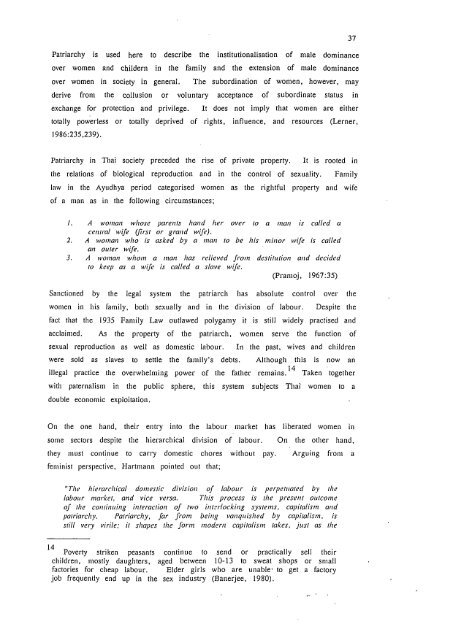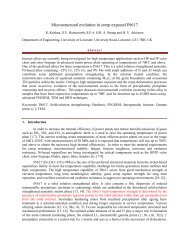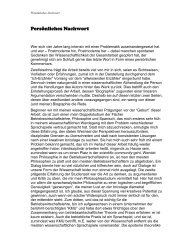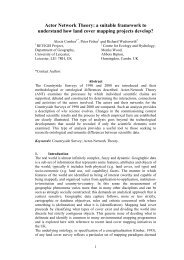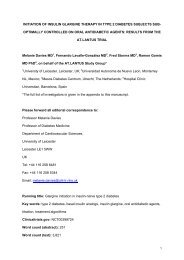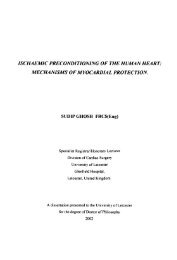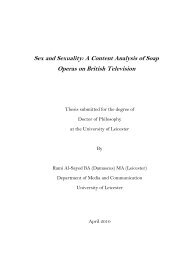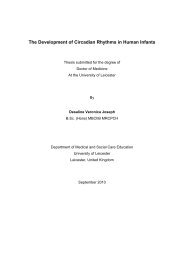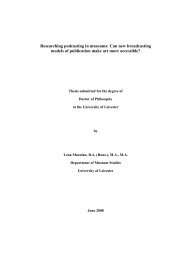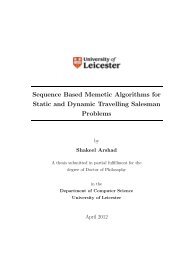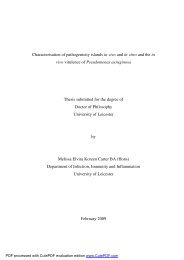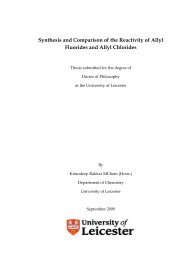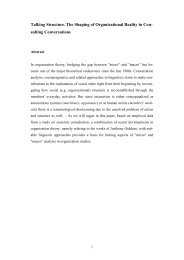iieiiei1eWrkers - Leicester Research Archive - University of Leicester
iieiiei1eWrkers - Leicester Research Archive - University of Leicester
iieiiei1eWrkers - Leicester Research Archive - University of Leicester
You also want an ePaper? Increase the reach of your titles
YUMPU automatically turns print PDFs into web optimized ePapers that Google loves.
Patriarchy is used here to describe the institutionalisation <strong>of</strong> male dominance<br />
over women and childern in the family and the extension <strong>of</strong> male dominance<br />
over women in society in general. The subordination <strong>of</strong> women, however, may<br />
derive from the collusion or voluntary acceptance <strong>of</strong> subordinate status in<br />
exchange for protection and privilege. It does not imply that women are either<br />
totally powerless or totally deprived <strong>of</strong> rights, influence, and resources (Lerner,<br />
1986:235,239).<br />
Patriarchy in Thai society preceded the rise <strong>of</strong> private property. It is rooted in<br />
the relations <strong>of</strong> biological reproduction and in the control <strong>of</strong> sexuality. Family<br />
law in the Ayudhya period categorised women as the rightful property and wife<br />
<strong>of</strong> a man as in the following circumstances;<br />
1. A woman whose parents hand her over to a man is called a<br />
central wife (first or grand wife).<br />
2. A woman who is asked by a man to be his minor wife is called<br />
an outer wife.<br />
3. A woman whom a man has relieved from destitution and decided<br />
to keep as a wife is called a slave wife.<br />
(Pramoj, 1967:35)<br />
Sanctioned by the legal system the patriarch has absolute control over the<br />
women in his family, both sexually and in the division <strong>of</strong> labour. Despite the<br />
fact that the 1935 Family Law outlawed polygamy it is still widely practised and<br />
acclaimed. As the property <strong>of</strong> the patriarch, women serve the function <strong>of</strong><br />
sexual reproduction as well as domestic labour. In the past, wives and children<br />
were sold as slaves to settle the family's debts. Although this is now an<br />
illegal practice the overwhelming power <strong>of</strong> the father remains. 14 Taken together<br />
with paternalism in the public sphere, this system subjects Thai women to a<br />
double economic exploitation.<br />
On the one hand, their entry into the labour market has liberated women in<br />
some sectors despite the hierarchical division <strong>of</strong> labour. On the other hand,<br />
they must continue to carry domestic chores without pay. Arguing from a<br />
feminist perspective, Hartmann pointed out that;<br />
"The hierarchical domestic division <strong>of</strong> labour is perpetuated by the<br />
labour market, and vice versa. This process is i/ic present outcome<br />
<strong>of</strong> the continuing interaction <strong>of</strong> two imiirlocking systems, capitalism and<br />
patriarchy. Patriarchy, far from being vanquished by capitalism, is<br />
still very virile; it shapes 1/ic form modern capitalism takes, just as tile<br />
14 Poverty striken peasants continue to send or practically sell their<br />
children, mostly daughters, aged between 10-13 to sweat shops or small<br />
factories for cheap labour. Elder girls who are unable' to get a factory<br />
job frequently end up in the sex industry (Banerjee, 1980).<br />
37


